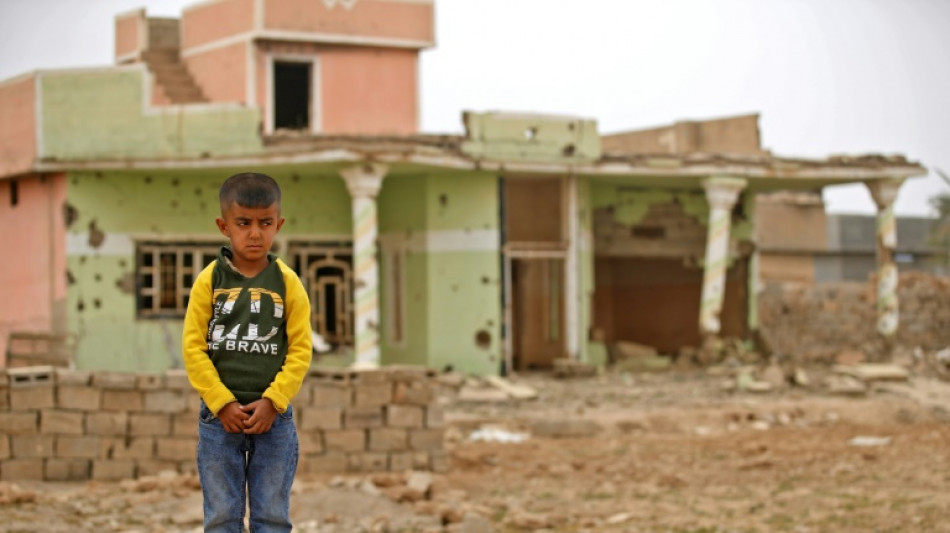
-
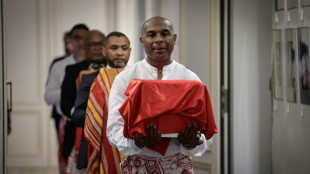 France returns skull of beheaded king to Madagascar
France returns skull of beheaded king to Madagascar
-
SpaceX's Starship megarocket launches on latest test flight
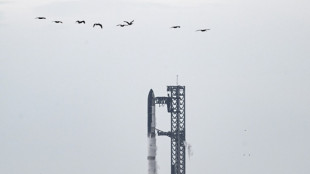
-
 US restaurant chain Cracker Barrel cracks, revives old logo
US restaurant chain Cracker Barrel cracks, revives old logo
-
Brazil's Bolsonaro placed under 24-hour watch ahead of coup trial verdict
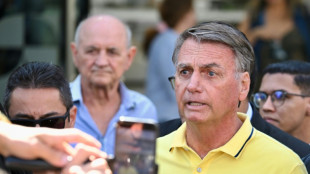
-
 Taylor-Travis love story: 5 things to know
Taylor-Travis love story: 5 things to know
-
Sports world congratulates Swift and Kelce on engagement

-
 Wolves inflict more woe on West Ham, Leeds crash out League Cup
Wolves inflict more woe on West Ham, Leeds crash out League Cup
-
Venezuela deploys warships, drones as US destroyers draw near

-
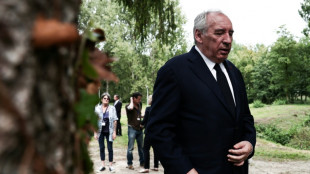 French political turmoil sends European stocks down, Wall Street edges up
French political turmoil sends European stocks down, Wall Street edges up
-
Sinner, Swiatek romp through at US Open
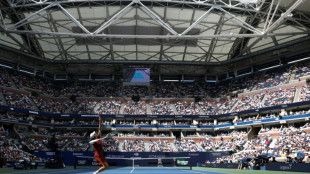
-
 Meta to back pro-AI candidates in California
Meta to back pro-AI candidates in California
-
Yankees-Giants set for earliest US MLB opener in 2026 schedule
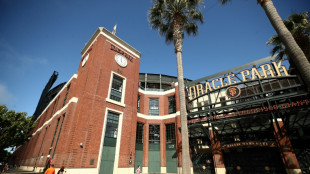
-
 Messi will be game-day decision for Miami in Leagues Cup semis
Messi will be game-day decision for Miami in Leagues Cup semis
-
'Swiftie' Swiatek swats Arango, talks Taylor & Travis engagement

-
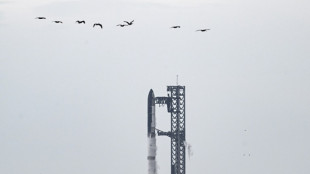 SpaceX set once more for Starship test flight
SpaceX set once more for Starship test flight
-
Sinner begins US Open defence with quick win

-
 Who is Lisa Cook, the Fed governor Trump seeks to fire?
Who is Lisa Cook, the Fed governor Trump seeks to fire?
-
Masters updates qualifying criteria to add six national opens

-
 New era unlocked: Taylor Swift and Travis Kelce announce engagement
New era unlocked: Taylor Swift and Travis Kelce announce engagement
-
Trump to seek death penalty for murders in US capital

-
 Taylor Swift and Travis Kelce announce engagement
Taylor Swift and Travis Kelce announce engagement
-
Swiatek swats Arango, Sinner launches US Open defence

-
 Swiatek swats Arango to reach US Open second round
Swiatek swats Arango to reach US Open second round
-
Tokyo-bound Duplantis, Lyles headline Diamond League finals

-
 Trump joins backlash against US restaurant Cracker Barrel
Trump joins backlash against US restaurant Cracker Barrel
-
US revokes visa of Brazil justice minister in Bolsonaro row
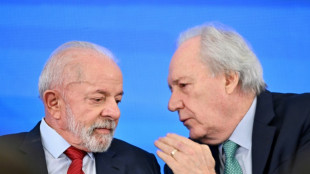
-
 Leverkusen sign former Real Madrid defender Vazquez
Leverkusen sign former Real Madrid defender Vazquez
-
India's Sindhu eyes medal on return to Paris for badminton worlds

-
 British rider Turner wins Vuelta sprint as Gaudu takes race lead
British rider Turner wins Vuelta sprint as Gaudu takes race lead
-
Sci-fi skies: 'Haboob' plunges Phoenix into darkness
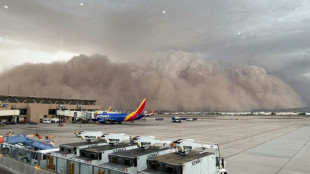
-
 Liverpool face Isak dilemma ahead of Arsenal visit to Anfield
Liverpool face Isak dilemma ahead of Arsenal visit to Anfield
-
French political turmoil sends European stocks sliding
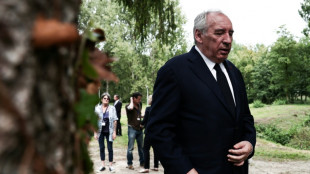
-
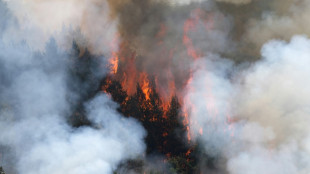 Spain calls wildfires one of its worst disasters in years
Spain calls wildfires one of its worst disasters in years
-
Cadillac choose experienced duo Perez and Bottas for F1 debut

-
 Dortmund sign Chukwuemeka from Chelsea until 2030
Dortmund sign Chukwuemeka from Chelsea until 2030
-
EU claims 'sovereign right' to regulate tech after Trump threat

-
 Veterans Perez, Bottas to drive for Cadillac in debut F1 season
Veterans Perez, Bottas to drive for Cadillac in debut F1 season
-
Living in 'sin'? Ronaldo, Rodriguez highlight Saudi double standard

-
 Stocks drop on France turmoil, Trump's Fed firing
Stocks drop on France turmoil, Trump's Fed firing
-
Miyazaki overcomes 'anxiety' to win on badminton worlds debut

-
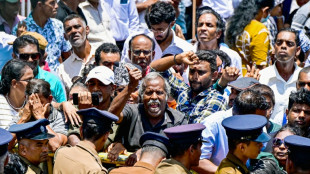 Sri Lanka's jailed ex-president granted bail
Sri Lanka's jailed ex-president granted bail
-
Jennifer Lawrence to get San Sebastian Festival award

-
 The European laws curbing big tech... and irking Trump
The European laws curbing big tech... and irking Trump
-
Germany, Canada to cooperate on key raw materials
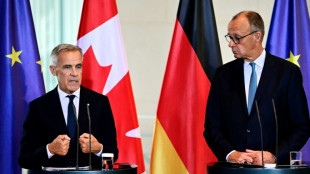
-
 Dortmund extend coach Kovac's contract
Dortmund extend coach Kovac's contract
-
Aid to famine-struck Gaza still 'drop in the ocean': WFP
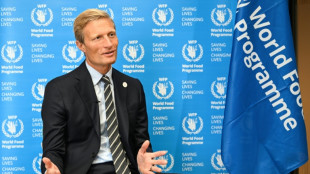
-
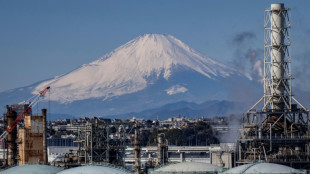 Japanese climber, 102, sets Mount Fuji record
Japanese climber, 102, sets Mount Fuji record
-
Israeli protesters call for hostage deal ahead of cabinet meeting
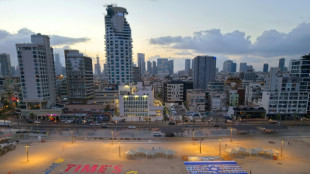
-
 Sinner, Swiatek, Gauff launch US Open title bids
Sinner, Swiatek, Gauff launch US Open title bids
-
US bids to trump China in DR Congo mining rush
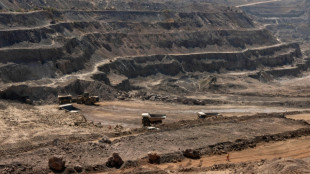

Years after IS defeat, northern Iraq struggles to rebuild
In Iraq, "maku" means "nothing", and father-of-five Issa al-Zamzoum says "maku" a lot: no electricity, no home, no rebuilding and no job.
Eight years after heavy fighting between Islamic State jihadists and the army, the reconstruction of his war-ravaged village in northern Iraq is at a standstill.
"There is nothing here, no electricity," 42-year-old Zamzoum sighed. "Even work, there is none."
Zamzoum lives with his wife and family in Habash, some 180 kilometres (110 miles) north of the capital Baghdad, a village dotted with dozens of bomb-blasted houses still ruined from intense fighting in 2014.
Part of their roof, which caved in during the bombardment, still lies in crumbling and bullet-scarred wreckage.
In one room, a hen watches over her chicks. In another, filthy mattresses are piled up against the wall.
The building does not even belong to Zamzoum: his own home was left uninhabitable.
While the Baghdad government eventually celebrated military "victory" over IS in December 2017, the scale of destruction was immense.
"Reconstruction? We do not see it," Zamzoum said gloomily. "Nothing has happened since the war."
- Sunni-Shiite tensions -
Habash paid a heavy price during IS's siege of Amerli, a town less than 10 kilometres away.
In 2014, the jihadists, who controlled the key northern city of Mosul and surrounding areas, moved south to attack Amerli, using surrounding settlements such as Habash as bases for their assault.
The combined forces of the Iraqi army, Shiite militias and Kurdish forces launched a counterattack to break the siege with gruelling street fighting, and IS forces were pushed out.
But for residents of the already hard-hit area, it was not the end of their suffering.
According to Human Rights Watch, after the siege "pro-government militias and volunteer fighters as well as Iraqi security forces raided Sunni villages and neighbourhoods" surrounding Amerli, including Habash.
HRW used satellite imagery to map "heavy smoke plumes of building fires, likely from arson attacks" in the village.
Today, nearly 20,000 people displaced by the conflict need aid in the area, according to the Norwegian Refugee Council, an aid agency.
"Humanitarian needs are significant," the NRC said.
As well as basic needs like clean water and electricity, even obtaining identity papers is a challenge for many.
"Many people have been displaced across governorates and face major barriers to travel to obtain civil documents," the NRC said.
"Others face security clearance issues related to perceived affiliation with the Islamic State" group, it added.
Like most of the residents of Habash, Zamzoum's neighbour Abdelkarim Nouri is a Sunni Muslim.
In Shiite-majority Iraq, Sunnis have sometimes been viewed with distrust, suspected of being complicit in past support of the extremists.
IS jihadists follow a radical interpretation of Sunni beliefs.
"Our life is a shame," Nouri said. "I don't have a job. I have five sheep, and they are the ones who keep me alive."
He said he had appealed to his member of parliament for support, but nothing had changed.
- 'Beyond our control' -
Nouri does not mention religion or talk of sectarianism -- a deeply sensitive topic in a country where tens of thousands of people died during bloody inter-religious conflict in 2006-2008.
Now, over four years since the end of IS's self-proclaimed "caliphate" in Iraq, many Sunnis say they are victims of harassment and discrimination.
A US State Department report last year cited concerns among Sunni officials that "government-affiliated Shia (Shiite) militia continued to forcibly displace Sunnis".
The report quoted officials describing "random arrests of Sunnis in areas north of Baghdad" and detentions made on suspicion of IS links.
In Salaheddin province, where Habash is located, officials speak of "security risks" which are delaying reconstruction -- without mentioning IS jihadists by name.
While Habash is under government control, the militants still operate just 15 kilometres further north.
On the road that leads to the village of Bir Ahmed, forces of the Hashed al-Shaabi -- a Shiite-led former paramilitary coalition now integrated into Iraq's state security apparatus -- stand guard.
"The situation in Bir Ahmed is beyond our control and that of the army," a senior officer said. "You can get in, but I can't guarantee you can get out."
I.Meyer--BTB
